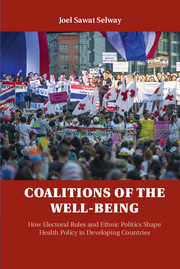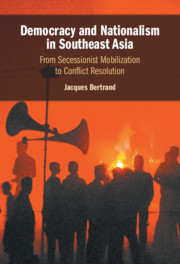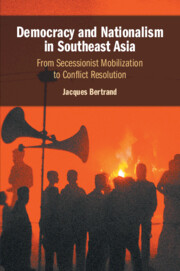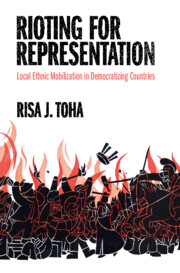Coalitions of the Well-being
Why do some developing countries have more efficient health systems and better health outcomes? Contrary to existing theory that posits the superiority of proportional representation (PR) rules on public-goods provision, this book argues that electoral rules function differently given the underlying ethnic structure. In countries with low ethnic salience, PR has the same positive effect as in past theories. In countries with high ethnic salience, the geographic distribution of ethnic groups further matters: where they are intermixed, PR rules are worse for health outcomes; where they are isolated, neither rule is superior. The theory is supported through a combination of careful analysis of electoral reform in individual country cases with numerous well-designed cross-country comparisons. The case studies include Thailand, Mauritius, Malaysia, Botswana, Burma, and Indonesia. The theory has broad implications for electoral rule design and helps a middle ground in the debate between the Consociational and Centripetal schools of thought.
- Emphasizes how incentives for constructing broad, national coalitions differ under various social structures
- Shows how Mauritius' ethnically diverse population and majoritarian electoral rules form a positive impact - where ethnic groups are geographically intermixed, majoritarian rules can help ease ethnic tensions in politics because it gives ethnic groups incentives to create pre-electoral pacts and vote for candidates from other groups
- Details how public anger and demand for good health policies were not enough in Thailand to transform this developing country into a paragon health system; instead, it was only when electoral reform changed the rules of political competition that the parties and politicians begin paying attention to broad, national concerns
Reviews & endorsements
"Public goods and their delivery is a core issue for scholars and policy makers alike. In this innovative and challenging contribution to comparative politics, Joel Selway shows how health policy - a key public good in any country - depends, in part, on the design of political institutions such as electoral systems and political parties. Particularly in ethnically diverse democracies, effective healthcare is a product of not just political will but of political engineering."
Benjamin Reilly, Sir Walter Murdoch School of Public Policy and International Affairs, Murdoch University, Western Australia
"This is a pathbreaking study. In terms of theory, the book goes well beyond arguments that democracy is best suited to provide public goods. Rather than a one-size-fits-all approach, Selway argues for a more fine-grained analysis in which the benefits of different electoral rules - proportional representation vs. majoritarianism - vary with countries’ sociological and spatial characteristics. Substantively, the study helps to explain why countries vary in such key development areas as public health policy. Finally, built largely on a series of carefully selected and closely examined comparative cases, the book demonstrates the benefits of well-designed qualitative analysis."
Richard F. Doner, Goodrich C. White Professor of Political Science, Emory University, Atlanta
Product details
June 2015Hardback
9781107103047
308 pages
229 × 152 × 21 mm
0.62kg
10 b/w illus. 9 maps 43 tables
Available
Table of Contents
- List of figures
- List of tables
- Part I. Electoral Rules, Ethnicity, and Health in Developing Countries:
- 1. Ethnic diversity or institutions? The source of public goods underprovision
- 2. Background and definitions
- 3. A socio-institutional theory of public goods provision
- 4. Testing the theory: health and education outcomes in developing democracies
- Part II. Electoral Rules and Health in Low Ethnic-Salience Countries:
- 5. Thailand: a new constitution and the introduction of universal healthcare
- 6. Single-member districts and medium-sized majority groups: Botswana and New Zealand
- Part III. Electoral Rules and Health in High Ethnic-Salience, Ethno-Geographically Intermixing Countries:
- 7. Mauritius: diversity and the success of majoritarian electoral rules
- 8. Malaysia: single-member districts, multi-ethnic parties and health
- Part IV. Electoral Rules in High Ethnic-Salience, Ethno-Geographically Isolated Countries:
- 9. Electoral rules and multiethnic parties in Burma's democratic era (1948–62)
- 10. Indonesia as a solution for ethno-geographically isolated societies
- Part V. Conclusion:
- 11. Conclusion
- References
- Index.









